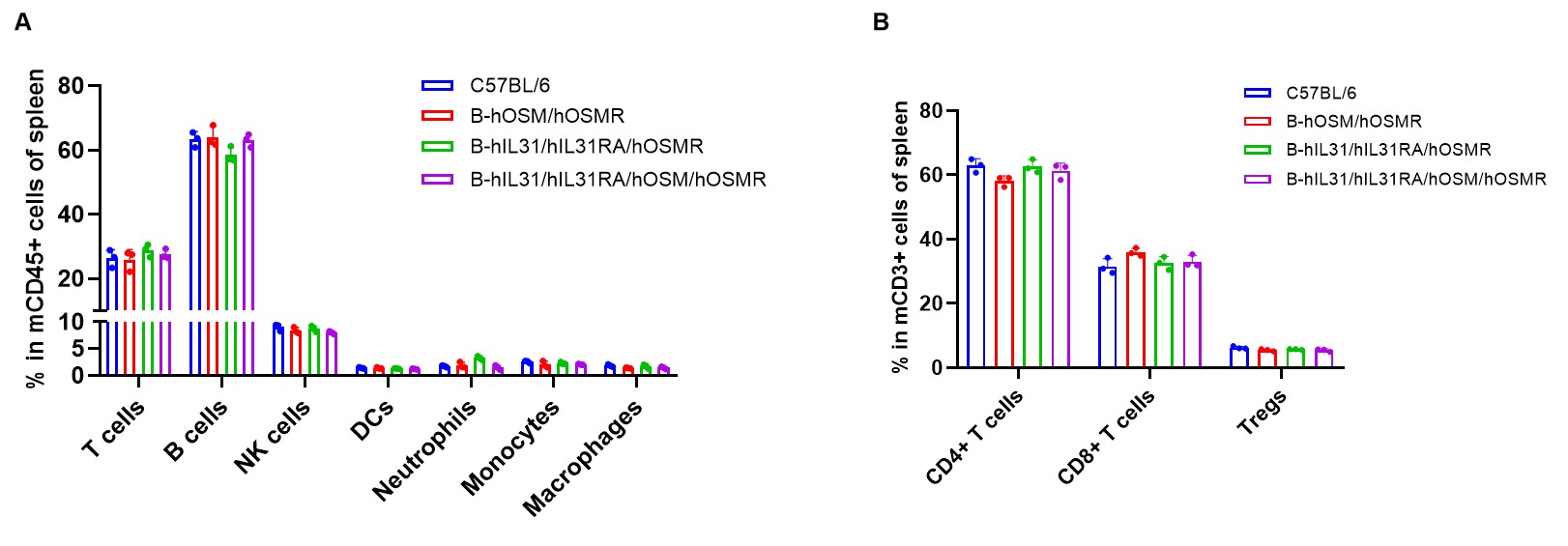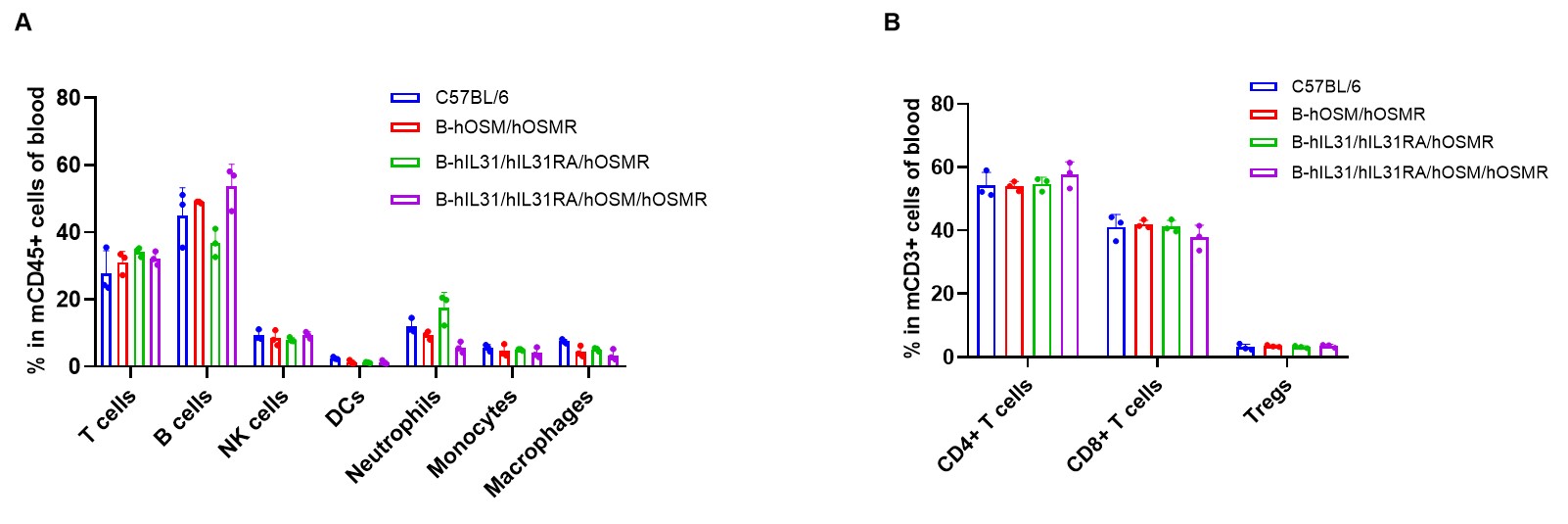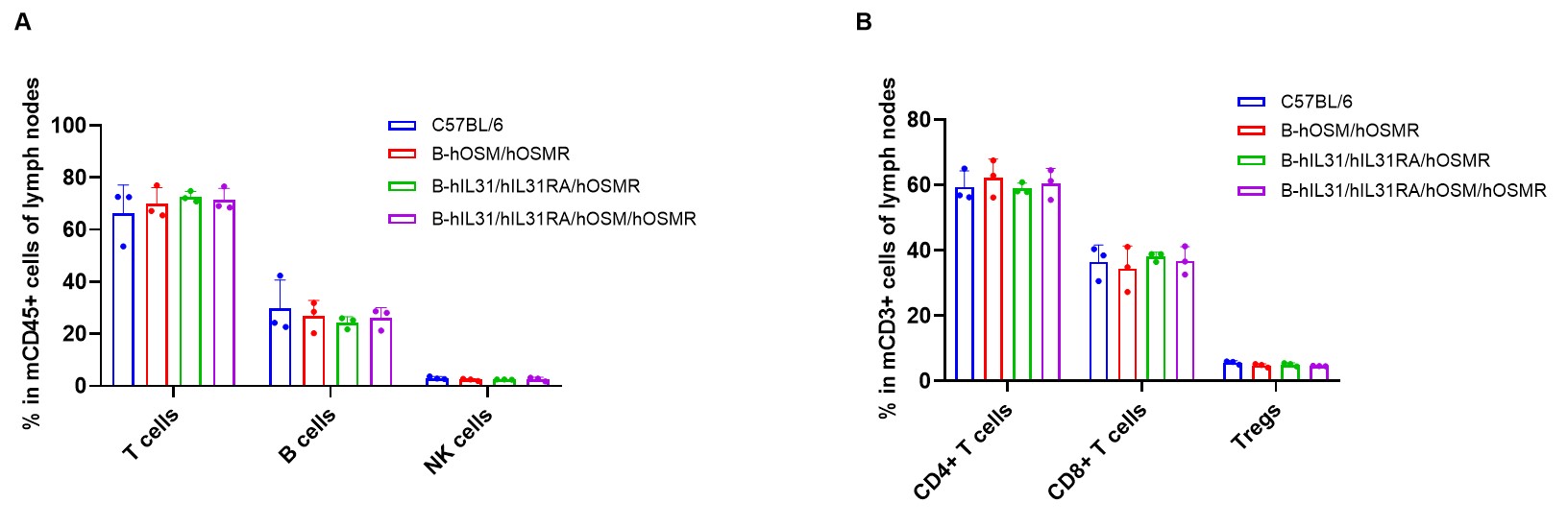Basic Information
-
mRNA expression analysis (IL31/IL31RA)

-

Strain specific analysis of IL31 and IL31RA gene expression in wild-type mice and homozygous B-hIL31/hIL31RA mice by RT-PCR. Testis was collect from wild type C57BL/6 mice (+/+) and B-hIL31/hIL31RA mice (H/H). Mouse Il31 and Il31ra mRNA were exclusively detectable in wild-type mice. Human IL31 and IL31RA mRNA were exclusively detectable in homozygous B-hIL31/hIL31RA mice, but not in wild type mice.
-
mRNA and protein expression analysis (OSMR)

-

Strain specific analysis of OSMR gene expression in wild-type mice and B-hOSMR mice by RT-PCR and western blot. (A) mRNA expression. Mouse Osmr mRNA was exclusively detectable in the kidney of wild-type mice (+/+). Human OSMR mRNA was exclusively detectable in homozygous B-hOSMR mice (H/H). (B) Protein expression. Kidney was collected from wild-type C57BL/6 mice (+/+) and homozygous B-hOSMR mice (H/H), and analyzed by western blot with anti-OSMR antibody. The OSMR protein can be detected in homozygous B-hOSMR mice.
-
Anti-hIL31RA antibodies attenuate scratching behaviors in human IL31-induced pruritus model

-

Anti-hIL31RA antibodies attenuate the scratching behaviors in IL31-induced murine pruritus model. Human IL31 was administered to the B-hIL31/hIL31RA/hOSMR mice (female, 12-week-old, 6 mice/group) to induce the scratching behaviors. Meanwhile, the mice were treated with nemolizumab analog (in-house) or PBS. Scratching behavior was recorded on day 1 (A), day 4 (B) and day 10 (C). Summary of the mouse Itching frequency in different groups shown in figure (D). As shown, IL31-treated mice show significantly increased scratching bouts. In the nemolizumab treatment group, blockade of IL-31 signaling with anti-hIL-31RA antibodies significantly attenuates scratching behaviors. Values are expressed as mean ± SEM. Significance was determined by the 2way ANOVA. (*P < 0.05, **P < 0.01, ***P < 0.0001)
-
Analysis of leukocytes cell subpopulation in spleen

-

Analysis of spleen leukocyte subpopulations by flow cytometry. Splenocytes were isolated from C57BL/6, B-hOSM/hOSMR mice, B-hIL31/hIL31RA/hOSMR mice and B-hIL31/hIL31RA/hOSM/hOSMR mice (n=3, 6 or 7-week-old, female, homozygous). Flow cytometry analysis of the splenocytes was performed to assess leukocyte subpopulations. (A) Spleen leukocyte subpopulations. (B) T cells subpopulations. Percent of T cells (CD8+ T cells, CD4+ T cells, and Tregs), B cells, NK cells, dendritic cells, neutrophils, macrophages and monocytes in B-hOSM/hOSMR mice, B-hIL31/hIL31RA/hOSMR mice and B-hIL31/hIL31RA/hOSM/hOSMR mice were similar to those in the C57BL/6 mice. Data was shown as mean ± SD, and analyzed using Ordinary one-way ANOVA method. (*p<0.05)
-
Analysis of leukocytes cell subpopulation in blood

-

Analysis of blood leukocyte subpopulations by flow cytometry. Blood cells were isolated from C57BL/6, B-hOSM/hOSMR mice, B-hIL31/hIL31RA/hOSMR mice and B-hIL31/hIL31RA/hOSM/hOSMR mice (n=3, 6 or 7-week-old, female, homozygous). Flow cytometry analysis of the blood was performed to assess leukocyte subpopulations. (A) Blood leukocyte subpopulations. (B) T cells subpopulations. Percent of T cells (CD8+ T cells, CD4+ T cells, and Tregs), B cells, NK cells, dendritic cells, neutrophils, macrophages and monocytes in B-hOSM/hOSMR mice, B-hIL31/hIL31RA/hOSMR mice and B-hIL31/hIL31RA/hOSM/hOSMR mice were similar to those in the C57BL/6 mice. Data was shown as mean ± SD, and analyzed using Ordinary one-way ANOVA method. (*p<0.05)
-
Analysis of leukocytes cell subpopulation in lymph node

-

Analysis of lymph node leukocyte subpopulations by flow cytometry. Lymph node cells were isolated from C57BL/6, B-hOSM/hOSMR mice, B-hIL31/hIL31RA/hOSMR mice and B-hIL31/hIL31RA/hOSM/hOSMR mice (n=3, 6 or 7-week-old, female, homozygous). Flow cytometry analysis of the lymph node was performed to assess leukocyte subpopulations. (A) Lymph node leukocyte subpopulations. (B) T cells subpopulations. Percent of T cells (CD8+ T cells, CD4+ T cells, and Tregs), B cells and NK cells in B-hOSM/hOSMR mice, B-hIL31/hIL31RA/hOSMR mice and B-hIL31/hIL31RA/hOSM/hOSMR mice were similar to those in the C57BL/6 mice. Data was shown as mean ± SD, and analyzed using Ordinary one-way ANOVA method. (*p<0.05)


